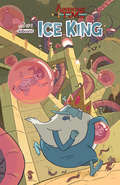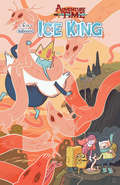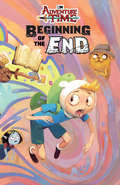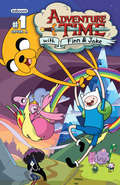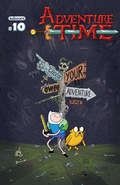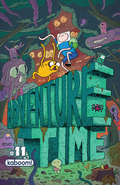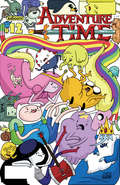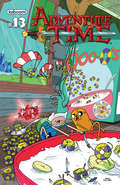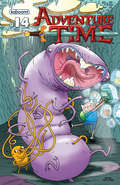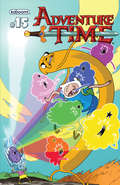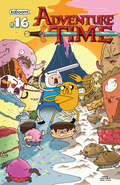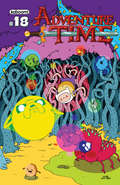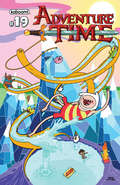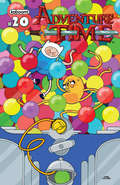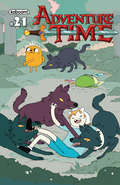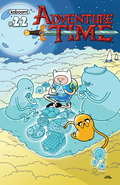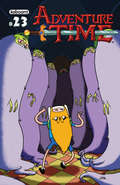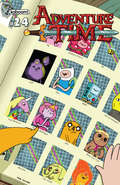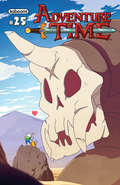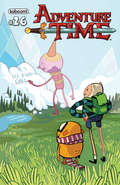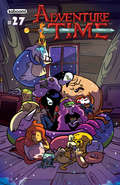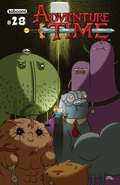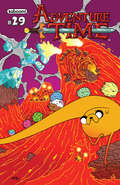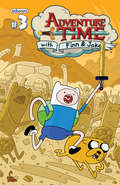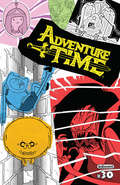- Table View
- List View
Adventure Time (Ice King #5)
by Natalie Andrewson Prana Naujokaitis Emily Partridge<p>Ice King and his cool wizard pals make it to Marble's lair and a battle ensues. <p>This is a fixed-format ebook, which preserves the design and layout of the original print book.</p>
Adventure Time (Ice King #6)
by Natalie Andrewson Prana Naujokaitis Emily Partridge<p>Final issue! Ice King discovers he was being used all along and gets ready to face off against the other wizards. <p>This is a fixed-format ebook, which preserves the design and layout of the original print book.</p>
Adventure Time (Planet of the Apes #1 - 3)
by Whitney Cogar Pendleton Ward Ted Anderson Marina Julia<p>When Finn breaks a promise he can't remember making, time itself begins to unravel around him. Finn must confront the ghosts of his past selves, the alternate selves of his present, and all his possible futures, while Jake gather help from all of Ooo and beyond. Celebrate the past, present and future of Adventure Time with this complete 3-issue series, and features a never before published bonus chapter you can’t miss! <p>This is a fixed-format ebook, which preserves the design and layout of the original print book.</p>
Adventure Time (Planet of the Apes #1)
by Pendleton Ward<p>It's Adventure Time! Join Finn the Human, Jake the Dog, and Princess Bubblegum for all-new adventures through The Land of Ooo. The top-rated Cartoon Network show now has its own comic book! With the show exploding in the ratings, garnering rave online reviews, major cosplay at the San Diego Comic-Con, and huge displays dominating the New York Comic Con, it's clear fandom is obsessed and 2012 is the Year of Adventure Time! Don't miss out on this new phenomenon - this first issue is sure to get snapped up! <p>This is a fixed-format ebook, which preserves the design and layout of the original print book.</p>
Adventure Time (Planet of the Apes #10)
by Pendleton Ward<p>THERE'S NO BETTER TIME TO JUMP INTO THE ALL-AGES SENSATION! Join Jake the Dog and Finn the Human as they have sensational adventures in the magical land of Ooo! If you haven't checked out the comic book adaptation of the hit Cartoon Network show, now's the time! <p>This is a fixed-format ebook, which preserves the design and layout of the original print book.</p>
Adventure Time (Planet of the Apes #11)
by Pendleton Ward<p>BRAND NEW ARC! PERFECT JUMPING ON POINT FOR NEW READERS! Join Jake the Dog and Finn the Human in the latest of their totally math adventures! Get on board for what critics are calling "the best series of 2012"! <p>This is a fixed-format ebook, which preserves the design and layout of the original print book.</p>
Adventure Time (Planet of the Apes #12)
by Pendleton Ward<p>THE HOTTEST ALL-AGES COMIC CELEBRATES ITS ONE YEAR ANNIVERSARY! <p>BMO's sick, but it's not just any virus...it's a magical virus! And now, Finn and Jake have to seek out a sorta-no-good-very-bad wizard to set things right! Don't miss the latest issue of what critics called "the best series of 2012!" <p>This is a fixed-format ebook, which preserves the design and layout of the original print book.</p>
Adventure Time (Planet of the Apes #13)
by Pendleton Ward<p>CRITICS ARE CALLING ADVENTURE TIME THE "BEST SERIES OF 2012!" The latest issue of the hottest all-ages comic on the stands now! Join Finn and Jake as they work to save BMO from a magical virus...by going INSIDE THE GAME! <p>This is a fixed-format ebook, which preserves the design and layout of the original print book.</p>
Adventure Time (Planet of the Apes #14)
by Pendleton Ward<p>FINAL ISSUE OF THE ARC! Finn and Jake are trapped inside a digital world... who can rescue the heroes? Find out in the latest installment of "the best comic of 2012!" An all-ages sensation! <p>This is a fixed-format ebook, which preserves the design and layout of the original print book.</p>
Adventure Time (Planet of the Apes #15)
by Pendleton Ward<p>A STAND-ALONE ISSUE LEADING INTO THE NEW ARC! A PERFECT JUMPING-ON POINT FOR NEW READERS! Join Jake the Dog and Finn the Human in this totally topsy-turvy take on the land of Ooo! The best all-ages series of 2012 continues! <p>This is a fixed-format ebook, which preserves the design and layout of the original print book.</p>
Adventure Time (Planet of the Apes #16)
by Pendleton Ward<p>THE FIRST ISSUE OF A NEW ARC AND THE PERFECT JUMPING-ON POINT FOR NEW READERS! It's an all-new adventure for Finn, Jake and the gang from critically acclaimed writer Ryan North! The best all-ages series of 2012 continues! <p>This is a fixed-format ebook, which preserves the design and layout of the original print book.</p>
Adventure Time (Planet of the Apes #18)
by Pendleton Ward<p>The TOTALLY MATH adventure continues with Finn and Jake, everyone's favorite human and dog duo! Will the guys find a way out of their dungeon despair, or will they have to settle for hanging with some tops blooby skeleton dudes? Only one way to find out, Candy People! <p>This is a fixed-format ebook, which preserves the design and layout of the original print book.</p>
Adventure Time (Planet of the Apes #19)
by Pendleton Ward<p>The TOTALLY MATH adventure continues with Finn and Jake, everyone's favorite human and dog duo! Will the guys find a way out of their dungeon despair, or will they have to settle for hanging with some tops blooby skeleton dudes? Only one way to find out, Candy People! <p>This is a fixed-format ebook, which preserves the design and layout of the original print book.</p>
Adventure Time (Planet of the Apes #20)
by Pendleton Ward<p>Finn and Jake have endured the Ice King's weird emotional dungeon adventure, and the fiery pits created by Marceline's dad...what will their final dungeon adventure bring? A great jumping-on point for dungeon masters and that friend of yours who only buys RPG video games! <p>This is a fixed-format ebook, which preserves the design and layout of the original print book.</p>
Adventure Time (Planet of the Apes #21)
by Pendleton Ward<p>It's another crazy adventure with our favorite heroes of Ooo. Join Finn and Jake as they protect their friends from the Ice King...who isn't really a bad guy...he's just kind of sad sometimes. But that's okay because Finn and Jake aren't sad, and that's what makes them our heroes! Jump into fantastical world, with adventures, lessons, and sometimes princess farts. <p>This is a fixed-format ebook, which preserves the design and layout of the original print book.</p>
Adventure Time (Planet of the Apes #22)
by Pendleton Ward<p>Finn and Jake find themselves in a sticky situation when Princess Bubblegum's experiments searching for the origin of life...specifically, her life...go horribly wrong, overcoming the Candy Kingdom! What sour weapon can the boys find that can overcome something so primordially sweet? <p>This is a fixed-format ebook, which preserves the design and layout of the original print book.</p>
Adventure Time (Planet of the Apes #23)
by Pendleton Ward<p>Will Princess Bubblegum be able to stop her creation from spreading, or is already too late for the Kingdom of Ooo?! With the Kingdoms Heroes under it's influence it leaves Marceline and Princess Bubblegum in a race again time as they try to find a way to not only save themselves, but everyone else in Ooo! <p>This is a fixed-format ebook, which preserves the design and layout of the original print book.</p>
Adventure Time (Planet of the Apes #24)
by Pendleton Ward<p>Princess Bubblegum faces the consequences of her science experiment gone wrong as she finally finds a way to save the day! But is it too late? Find out if Princess Bubblegum is able to right all her wrongs or if her friends will never be themselves again, it's a crazy conclusion to this arc! <p>This is a fixed-format ebook, which preserves the design and layout of the original print book.</p>
Adventure Time (Planet of the Apes #25)
by Pendleton Ward<p>Ever have a favorite item? Something that you plan to keep with you always? Something that has a history back further than you can remember? Something precious...cherished...that will continue on after you've left on your final adventure and keep continuing. This is the story of that gem, and how truly loved it was. Join an ensemble of fan-favorite creators as we celebrate the 25th issue of ADVENTURE TIME with this very special issue! <p>This is a fixed-format ebook, which preserves the design and layout of the original print book.</p>
Adventure Time (Planet of the Apes #26)
by Pendleton Ward<p>Finn and Jake have always been best buds; they are always together, it's just something best buds do. But what happens when these two friends get separated on a crazy adventure with twists and turns? Will our pals be able to find each other again or is this just all part of growing up? <p>This is a fixed-format ebook, which preserves the design and layout of the original print book.</p>
Adventure Time (Planet of the Apes #27)
by Pendleton Ward<p>This special arc with guest artist Jim Rugg continues!! Finn and Jake might have finally met their match, but what will happen with it turns out that the match isn't a match at all? Things are getting crazy in the land of Ooo and it looks like our heroes might need someone to save them this time around. <p>This is a fixed-format ebook, which preserves the design and layout of the original print book.</p>
Adventure Time (Planet of the Apes #28)
by Pendleton Ward<p>With one answer, there is always a million questions. Finn and Jake find themselves out of one problem and into another. It looks like it's going to be a race to the finish as our heroes discover what it really means to be a friend, and learn something about themselves along the way. <p>This is a fixed-format ebook, which preserves the design and layout of the original print book.</p>
Adventure Time (Planet of the Apes #29)
by Pendleton Ward<p>Finn and Jake are back in their bodies, but it looks like the damage is done. Will our heroes be able to right everything they've done or is Ooo finally lost? With the help of an unlikely source, this day might be saved. Last issue by the talented Jim Rugg (Street Angel, Afrodisiac)! <p>This is a fixed-format ebook, which preserves the design and layout of the original print book.</p>
Adventure Time (Planet of the Apes #3)
by Pendleton Ward<p>Algebraic! Don't miss Finn, Jake, and all of their friends on their biggest adventure yet! Trapped by the dreaded Lich, the guys gotta stop all of Ooo from being sucked away forever - and rescue a bunch of wayward Princesses. Luckily, no one does adventure - and looks cooler doing it - than Finn and Jake! The Cartoon Network sensation's brand new comic is the hot new series you can't afford to miss! Also includes "BACON FIELDS" and "THE RIDE OF SIR SLICER!" <p>This is a fixed-format ebook, which preserves the design and layout of the original print book.</p>
Adventure Time (Planet of the Apes #30)
by Pendleton Ward<p>It's a rad stand-alone ZINE Special! Enjoy this crazy special as the citizens of Ooo create their own zines to share. Marceline has a lot to say about her music, Peppermint Butler has a few life tips for anyone who will listen (and everyone should listen), and Finn creates his very first journal comic. A sick homage to DIY and mini-comics culture printed on uncoated paper and made to look like a zine from the ADVENTURE TIME gang! <p>This is a fixed-format ebook, which preserves the design and layout of the original print book.</p>
